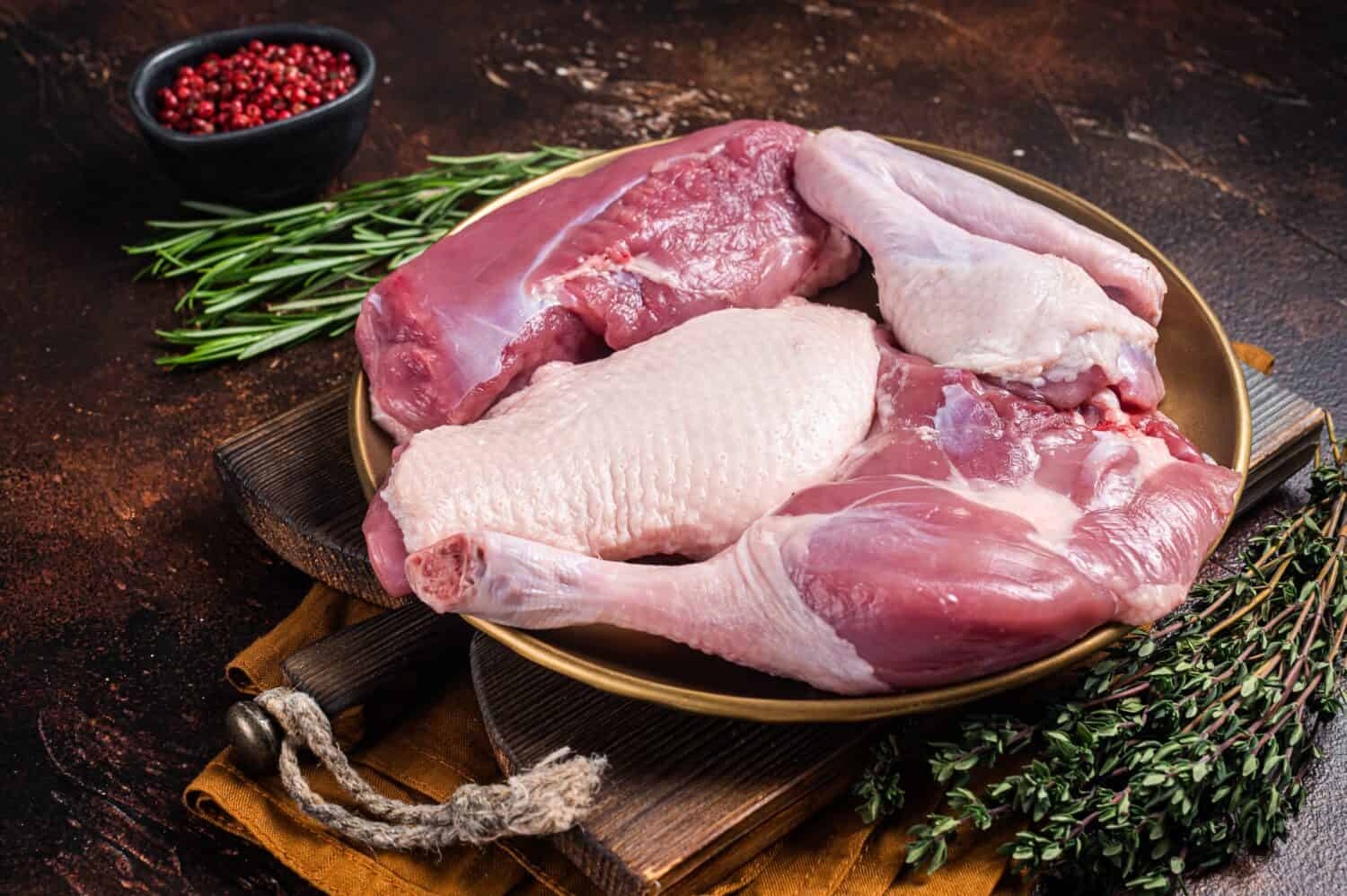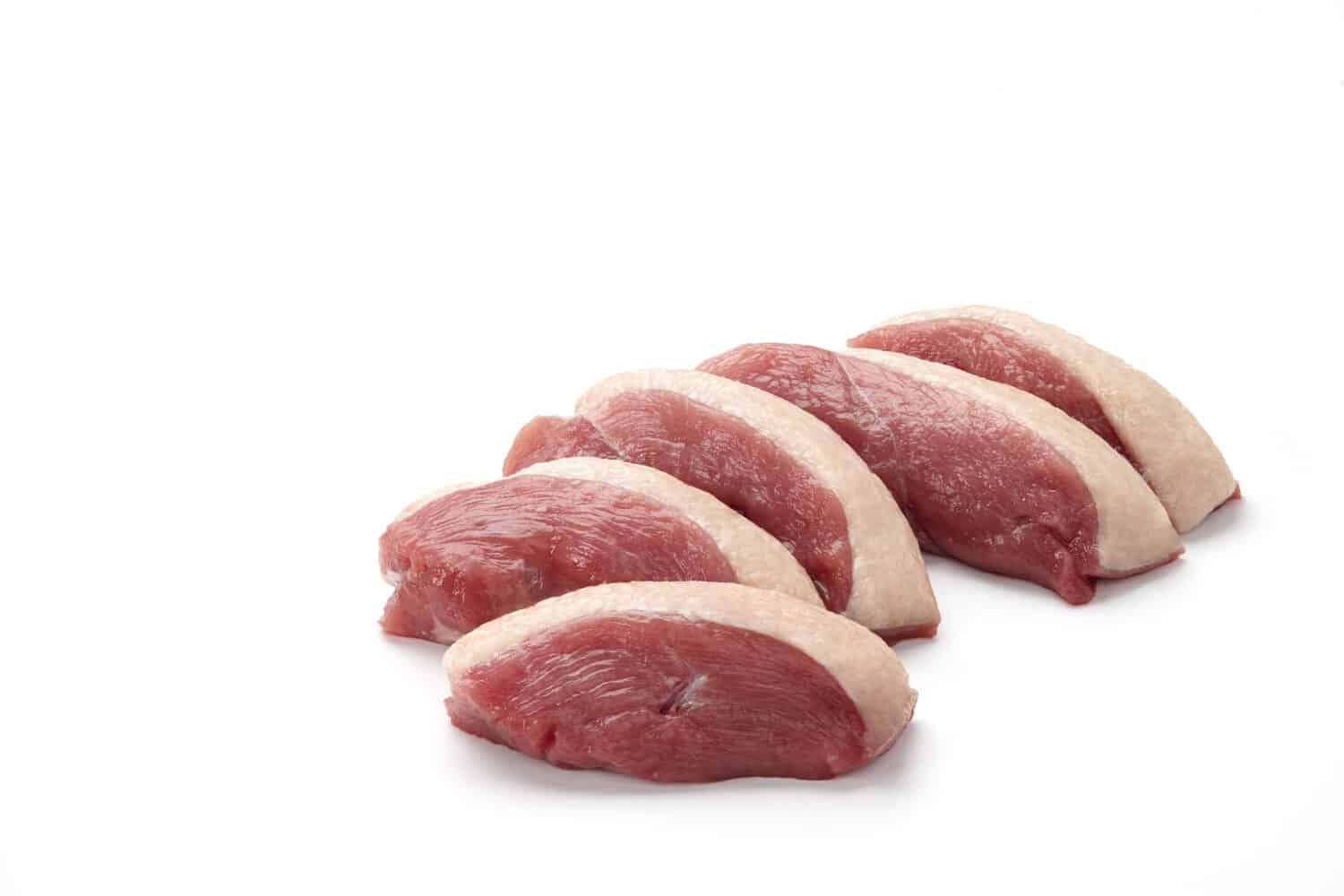In this article, we explore the world of duck meat – a culinary delight gaining popularity among food enthusiasts. Get ready to explore its rich taste, nutritional value, and versatility in the kitchen. Learn about the health benefits, from its unique fatty acid profile to its ability to support brain function and cardiovascular health. Additionally, we’ll cover the lean protein, essential vitamins, and minerals that contribute to a balanced diet.
There are various cooking methods and distinct flavors and textures that make duck meat exceptional. Uncover perfect pairings, tips, and ideas to elevate your duck dishes. Also, let’s make sure we understand the sustainability and ethical considerations of duck meat production. Join us on a culinary adventure, as we expand our palate and savor the unique tastes of duck meat!
The Nutritional Value of Duck Meat

Duck meat is not only delicious but surprisingly nutritious.
©Mironov Vladimir/Shutterstock.com
Duck meat has a treasure trove of nutritional benefits, making it a wise choice for those seeking a wholesome and delicious addition to their diet. Let’s dive into the reasons why duck meat deserves a place on your plate.
Lean Protein:
One of the standout features of duck meat is its lean protein content. Unlike other meats, duck is relatively low in fat, making it an excellent choice for those aiming to maintain a healthy weight or reduce their fat intake. The lean protein not only aids in satiety and muscle development but also supports overall heart health. It is crucial for building and repairing tissues, supporting muscle growth, and maintaining a strong immune system. Incorporating it into your diet ensures your body receives the necessary amino acids to function at its best.
Vitamins:
In addition to protein, duck meat features a range of essential vitamins. It is particularly rich in B vitamins, including thiamin, riboflavin, niacin, and vitamin B12. These vitamins play a vital role in energy production, nerve function, and red blood cell formation, ensuring your body operates at its peak performance.
Minerals:
When it comes to minerals, duck meat shines with its iron, zinc, and selenium content. Iron is essential for oxygen transportation throughout the body and plays a key role in preventing iron-deficiency anemia. Zinc supports immune function and aids in wound healing, while selenium acts as a powerful antioxidant, protecting cells from damage.
Essential Fatty Acids:
Duck meat boasts a unique fatty acid profile that contributes to cardiovascular health. The composition of fatty acids sets it apart from other meats and offers potential benefits for heart health.
One important aspect of the fatty acid profile is its omega-3 fatty acid content. These fatty acids reduce inflammation, lower blood pressure, and improve overall heart function. While fish is often lauded as the primary source of omega-3 fatty acids, duck meat also contains appreciable levels of these beneficial fats.
Additionally, this poultry contains monounsaturated fatty acids (MUFAs) and polyunsaturated fatty acids (PUFAs) that support cardiovascular health. MUFAs, such as oleic acid, have been associated with reducing LDL cholesterol levels and improving insulin sensitivity. PUFAs, including linoleic acid, are linked to reducing the risk of heart disease and improving lipid profiles.
Brain Function
Apart from its cardiovascular benefits, duck meat also plays a role in supporting brain function. The brain relies on a steady supply of essential nutrients to function optimally, and this poultry provides several key components that contribute to brain health.
One notable nutrient is choline, an essential nutrient involved in various brain functions, including memory, learning, and cognitive performance. It is a precursor to acetylcholine, a neurotransmitter critical for communication between brain cells. Adequate choline intake is crucial for maintaining healthy brain function, and duck meat is a good dietary source of this important nutrient.
Incorporating duck meat into your diet can provide the necessary nutrients to support brain health and cognitive function. By enjoying this delicious and nutritious meat, you can nourish your brain and support its optimal performance.
Please note: While duck meat offers potential benefits for cardiovascular health and brain function, it’s important to maintain a balanced diet and consult with a healthcare professional for personalized dietary advice.
Culinary Versatility

You can cook duck meat in a variety of ways.
©kobeza/Shutterstock.com
Duck meat offers a remarkable culinary versatility, with a range of cooking methods, cuts, and its presence in both traditional and international cuisines. Let’s explore these aspects in detail!
Cooking Methods:
Roasting: Roasting is a popular cooking method, resulting in crispy skin and tender, flavorful meat. The high-fat content of duck helps keep it moist during roasting.
Grilling: Grilling imparts a smoky flavor and caramelizes the skin, creating a delicious contrast between the crispy exterior and juicy interior.
Pan-searing: Pan-searing is ideal for duck breasts, achieving a crispy skin while maintaining a tender and medium-rare to medium doneness.
Confit: Duck confit involves slow-cooking duck legs in their rendered fat, resulting in incredibly tender and flavorful meat with a rich, melt-in-your-mouth texture.
Stir-frying: Duck meat can be sliced thinly and stir-fried with vegetables and sauces, resulting in a flavorful and quick meal.
Enhancing Recipes with Different Cuts:
Duck Breast: Duck breast is known for its rich flavor and tender meat. It can be cooked to various levels of doneness and pairs well with fruity or savory sauces.
Duck Legs: Duck legs are perfect for slow-cooking methods like confit or braising, resulting in succulent, fall-off-the-bone meat.
Duck Wings: Duck wings are often used for making flavorful stocks, broths, or sauces, adding depth and richness to various recipes.
Use in Traditional and International Cuisines:
Traditional Cuisine: Duck meat holds a prominent place in traditional cuisines such as French and Chinese. In French cuisine, duck à l’orange is a classic dish featuring roasted duck with citrus sauce. In Chinese cuisine, Peking duck is renowned, known for its crispy skin and tender meat wrapped in pancakes with hoisin sauce.
International Cuisines: Duck meat is also widely used in other international cuisines. For instance, in Thai cuisine, red curry duck is a popular dish combining tender duck meat with aromatic spices and coconut milk. In Moroccan cuisine, duck is often used in tagines, slow-cooked with spices, dried fruits, and aromatic herbs.
Flavor Profiles and Culinary Pairings

Duck meat pairs well with a variety of ingredients and flavors.
©Ratov Maxim/Shutterstock.com
Distinct Flavors and Textures of Duck Meat:
Duck meat offers a unique flavor profile that sets it apart from other meats. It is known for its rich, gamey taste, with a hint of sweetness. The meat has a tender and succulent texture, while the skin is prized for its crispy and flavorful quality. The high-fat content of duck meat contributes to its richness and juiciness.
Complementary Ingredients and Flavors:
To enhance the taste of duck meat, complementary ingredients, and flavors can be used. Here are some suggestions:
Fruity Pairings: Duck meat pairs well with fruits like orange, cherry, cranberry, and plum. The acidity and sweetness of these fruits complement the richness of the meat.
Aromatic Herbs and Spices: Herbs like thyme, rosemary, sage, and spices such as cinnamon, star anise, and ginger add depth and complexity to the flavor of duck meat.
Rich Sauces: Creamy sauces like hoisin, orange glaze, cherry reduction, and red wine reduction enhance the taste of duck by adding layers of flavor and moisture.
Earthy Ingredients: Mushrooms, truffles, and root vegetables like sweet potato and parsnip provide earthy flavors that pair well with the richness of duck meat.
Popular Dishes featuring Duck Meat:
Peking Duck: This traditional Chinese dish is characterized by roasted duck with crispy skin, served with pancakes, scallions, and hoisin sauce for a delightful combination of flavors and textures.
Duck Confit: In this French dish, duck legs are slow-cooked in their own fat until tender and then crisped up. The result is incredibly flavorful and juicy meat with a crispy skin.
Duck à l’Orange: Another classic French dish, it features roasted duck with a tangy orange sauce. The combination of sweet and citrus flavors complements the richness of the meat.
Duck Breast with Cherry Sauce: Pan-seared duck breast served with a luscious cherry sauce creates a perfect balance of sweet and savory flavors.
Thai Red Curry Duck: This Thai dish combines tender duck meat with aromatic red curry paste, coconut milk, and a variety of vegetables for a spicy and flavorful meal.
These examples highlight the versatility of duck meat and the variety of flavors and cuisines it can be incorporated into. The distinct flavors and textures of duck meat, along with thoughtful pairings, create memorable and delicious dishes.
Sustainability and Ethical Considerations

Duck farming in a sustainable manner is essential when it comes to production.
©CHI-CHEN/Shutterstock.com
Sustainable Farming Practices:
Sustainable farming practices for duck meat production focus on minimizing environmental impact and promoting animal welfare. Here are some key practices:
Free-range and Pasture-Raised: Raising ducks in free-range or pasture-based systems allows them to roam, forage, and exhibit natural behaviors. This reduces the need for intensive confinement and promotes animal welfare.
Natural Feeding: Ducks are often fed a diet that includes a mix of grains, grasses, insects, and aquatic plants. Using natural and locally sourced feed reduces reliance on synthetic additives and decreases the carbon footprint associated with feed production.
Water Conservation: Ducks require access to clean water for drinking and bathing. Sustainable farms implement water management strategies, such as recycling and reusing water, to conserve this precious resource.
Responsible Waste Management: Proper waste management systems, such as composting and manure management, help minimize the environmental impact of duck farming by reducing pollution and nutrient runoff.
Ethical Considerations:
When comparing the ethical considerations of consuming duck meat to other meats, several factors come into play:
Animal Welfare: Ethical concerns arise when animals are raised in confined and stressful conditions. While some duck farms may use intensive systems, there is a growing trend towards more humane practices, such as free-range and pasture-based farming, which prioritize the well-being of the ducks.
Environmental Impact: The environmental footprint of duck meat production can vary depending on farming practices. Supporting farms that prioritize sustainable practices helps reduce the negative impact on ecosystems, water resources, and climate change.
How Responsible Duck Farming Supports a Sustainable Food System:
Supporting responsible duck farming contributes to a more sustainable food system in several ways:
Conservation of Biodiversity: Ducks play a crucial role in maintaining wetland ecosystems and biodiversity. Responsible duck farming practices, such as preserving natural habitats and promoting wetland conservation, help protect these ecosystems.
Reduced Carbon Footprint: Sustainable farming practices, including natural feeding and responsible waste management, help reduce greenhouse gas emissions and minimize the carbon footprint associated with production.
Support for Local Economies: By choosing locally sourced duck meat from sustainable farms, consumers contribute to their local economies and help maintain a diverse and resilient food system.
Animal Welfare Advocacy: Supporting farms that prioritize animal welfare encourages the industry as a whole to move towards more ethical and humane practices, benefiting not only ducks but also other animals in the agricultural sector.
In Conclusion
Duck meat offers a range of benefits and delicious flavors that make it a worthwhile culinary experience. From its unique taste to its versatility in various cuisines, duck meat provides a delightful alternative to more common meats. The sustainable farming practices associated with production contribute to a more environmentally friendly and ethical food system. This includes free-range and natural feeding. By considering the benefits and supporting responsible farming, individuals can not only enjoy a delectable meal but also contribute to a more sustainable and conscious approach to food consumption.
Whether you’re a food enthusiast or an adventurous eater, trying duck meat is an opportunity to broaden your palate and explore the diverse world of flavors that this exceptional meat has to offer. So, step out of your comfort zone, embrace the culinary adventure, and savor the benefits and delicious flavors of duck meat.
The photo featured at the top of this post is © Ryzhkov Photography/Shutterstock.com
Thank you for reading! Have some feedback for us? Contact the AZ Animals editorial team.







